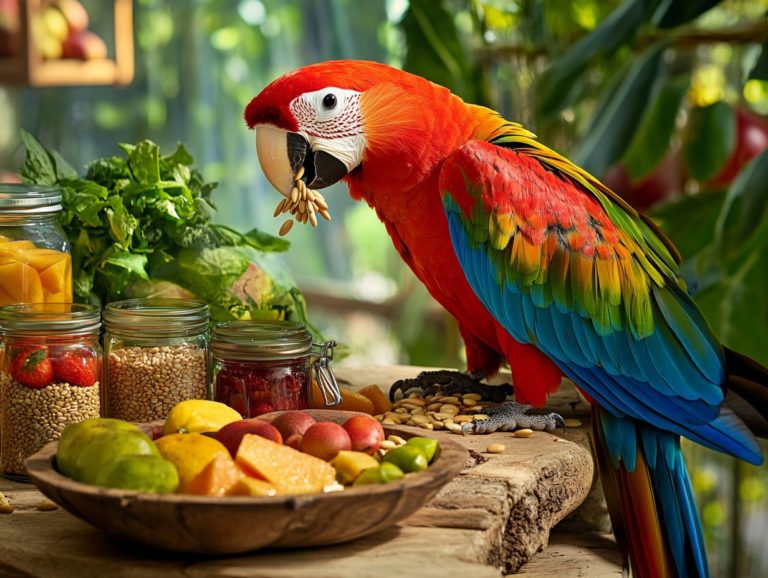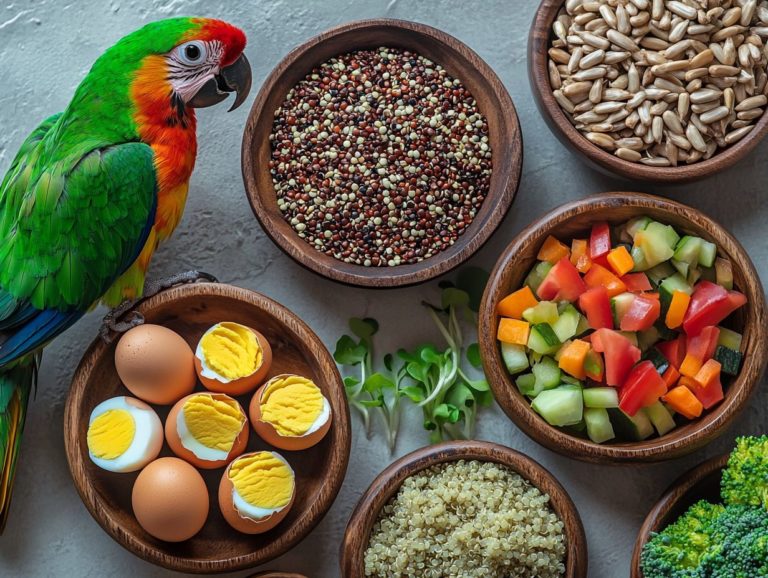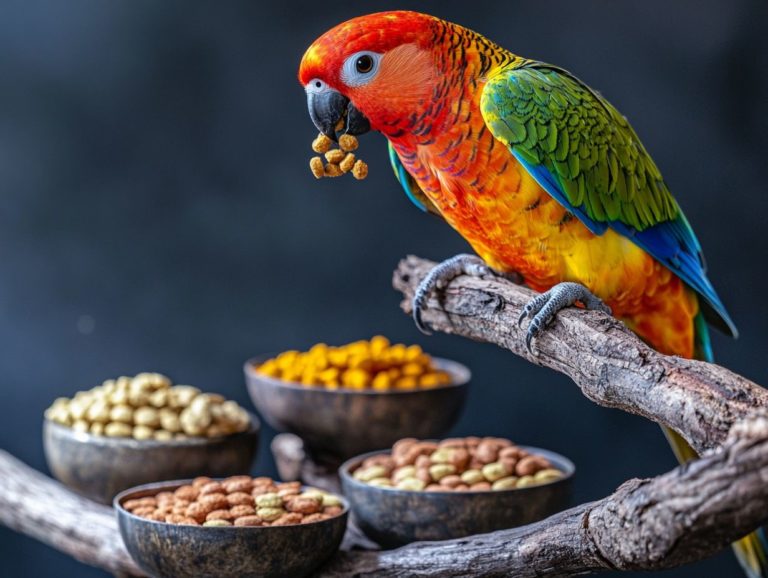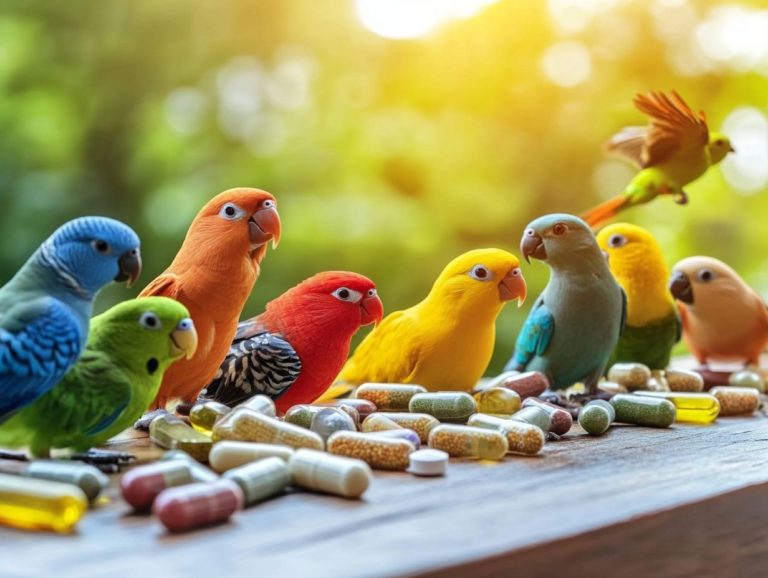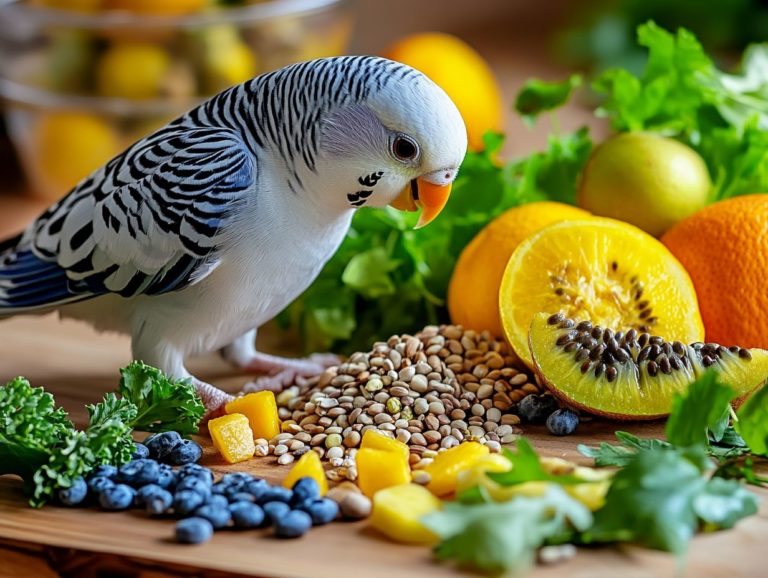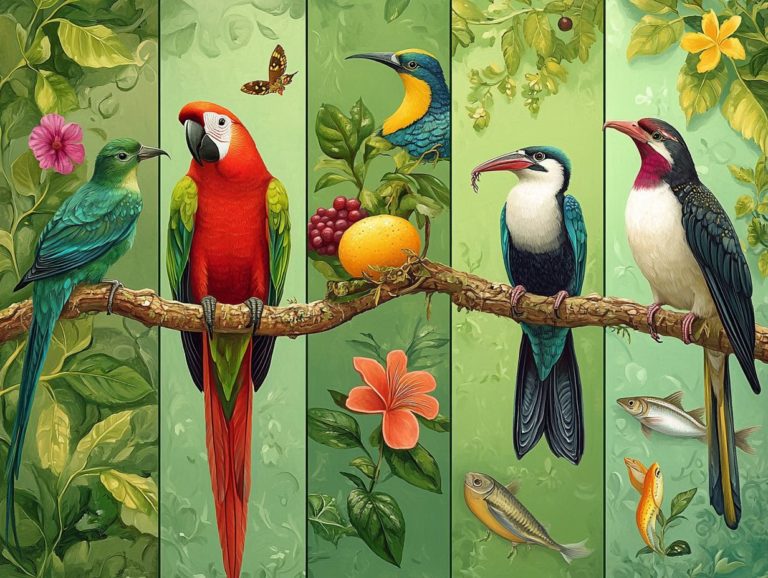5 Essentials in Bird Nutrition You Must Know
Keeping your feathered friends healthy begins with understanding their unique nutritional needs.
Just like you, birds require a balanced diet to thrive, packed with essential nutrients that support their overall well-being.
This article delves into the importance of proper nutrition, highlights the critical nutrients your bird needs, and discusses which foods should be avoided.
You ll also learn how to craft a healthy diet plan, recognize signs of nutritional deficiencies, and ensure your bird stays well-hydrated.
Jump in to discover the best ways to provide your bird with exceptional care!
Contents
Key Takeaways:
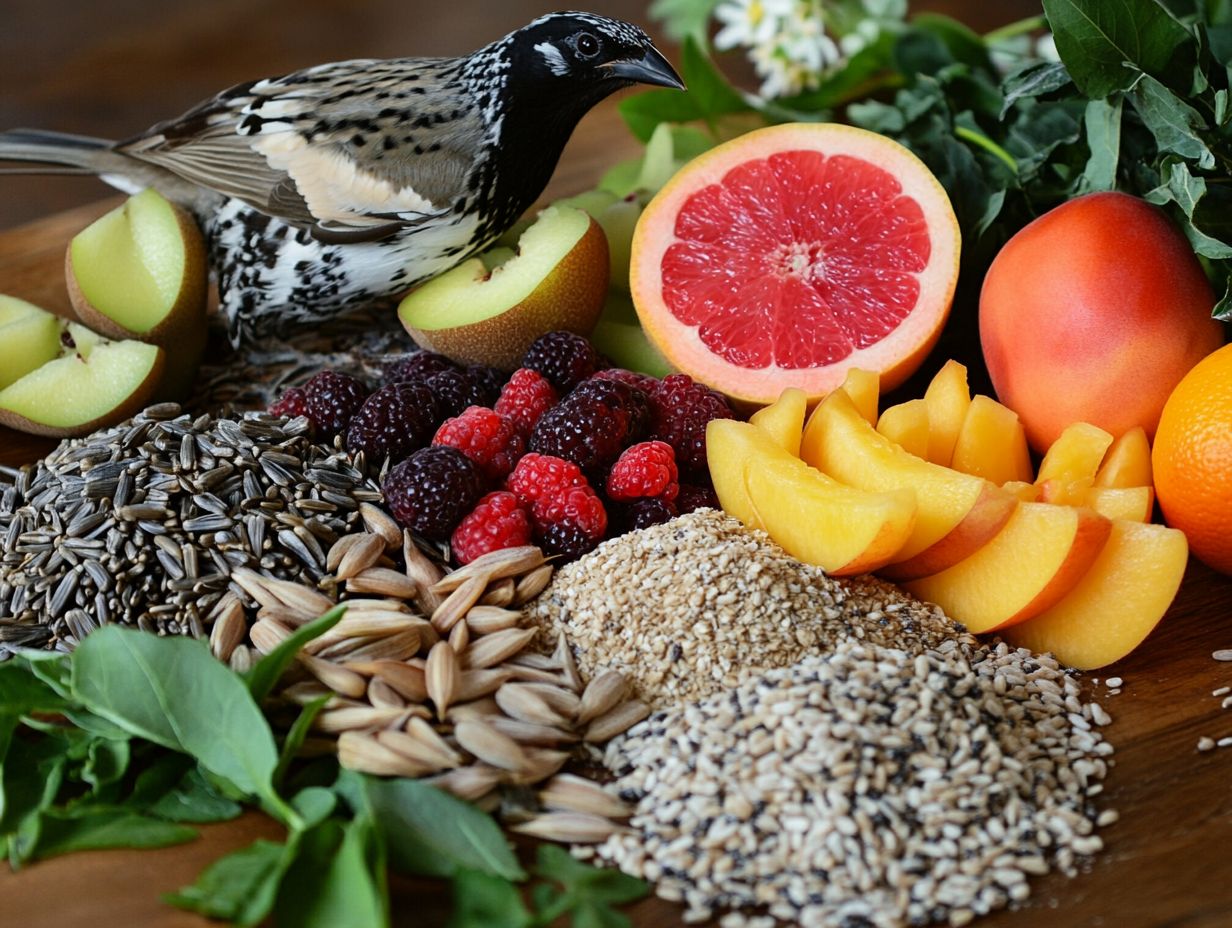
- Understanding the unique nutritional needs of birds is crucial for their overall health and well-being.
- A balanced diet, consisting of a variety of foods, is essential for meeting all of a bird’s nutritional requirements.
- Birds require essential nutrients such as protein, carbohydrates, fats, vitamins, and minerals to maintain optimal health.
1. Understanding the Nutritional Needs of Birds
Understanding the nutritional needs of birds is vital for ensuring their health and well-being. A well-balanced diet, which can include 5 superfoods for a healthier bird, can profoundly impact their longevity and vitality, much like the bird food pyramid that helps you choose the right foods, including pellets, fresh veggies, healthy treats, and protein boosters.
To create a feeding routine, incorporate a variety of foods that meet their dietary requirements. Good-quality pellets should form the foundation of their diet, as they are specifically designed to deliver essential vitamins and minerals.
Add fresh vegetables daily, such as leafy greens and carrots, to enhance flavor and contribute valuable nutrients that promote overall health. Occasional treats such as seeds or nuts can serve as delightful rewards, stimulating natural foraging behaviors.
Experts at Delavan Lakes Veterinary Clinic stress the importance of balancing these foods to prevent obesity and ensure proper nutrition. Diane Burroughs in Avian Medicine highlights the significance of safe calcium sources, especially for breeding hens or elderly birds, underscoring the crucial role of vitamins and minerals essential for birds in a well-rounded avian diet.
2. The Importance of a Balanced Diet
A balanced diet is crucial for your birds, as it helps prevent malnutrition, which means not getting enough nutrients, and supports their overall health. For more detailed information, check out understanding lovebird nutrition; the bird food pyramid serves as an invaluable guide, helping you provide the right mix of proteins, vitamins, and minerals.
Understanding the specific dietary needs of each species is key, as different birds have unique nutritional requirements based on their size, age, and activity levels. For example, seed-eating birds like finches may flourish on a seed mix enhanced with fresh fruits and vegetables, while insectivorous species like canaries thrive on high-protein meals featuring mealworms or specially prepared insect food.
By utilizing the bird food pyramid, you can craft meal plans that encompass a variety of food groups. This ensures your feathered friends receive a well-rounded diet. Introduce new foods gradually and observe any changes in behavior or health, consistently tailoring the diet to suit each bird’s individual preferences and needs.
3. Essential Nutrients for Birds
Essential nutrients like proteins, vitamins, and minerals are crucial for your birds, playing a vital role in their growth, development, and overall health. To truly enhance their vitality, pay particular attention to key elements such as healthy fats and calcium absorption, along with insights from a comprehensive guide to bird nutrition.
These primary nutrients, along with vitamin C, act as powerful antioxidants, supporting your birds’ immune systems and helping to alleviate stress in avian species.
Don t overlook the potential of fresh herbs; they can provide a treasure trove of beneficial compounds that promote digestion, enhance flavor, and contribute critical vitamins to your birds diet.
By incorporating these elements into their meals, you can help your birds live healthier and happier lives. Using 5 pet bird nutrition apps can aid in providing a balanced diet featuring vitamins from fruits, leafy greens, and select grains to maximize their energy levels and longevity.
4. Foods to Avoid for Birds
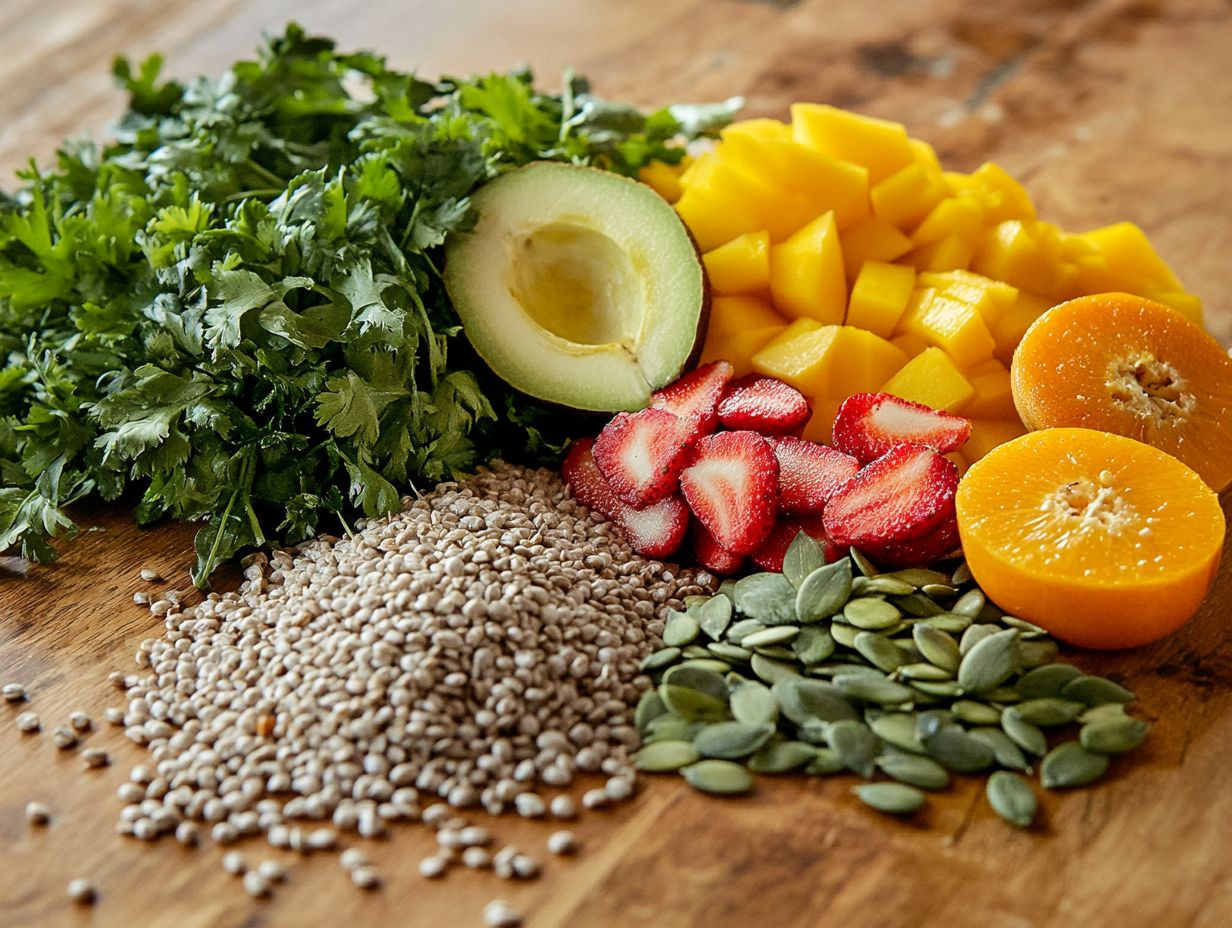
Certain foods can pose serious risks to your feathered friends. Items like avocado, chocolate, and caffeine can lead to severe health issues. These include the dangerous Psittacine Beak and Feather Disease, which can be fatal. You’ll want to keep these foods away from your birds for their safety!
These harmful foods contain substances that can wreak havoc on a bird’s digestive system, potentially leading to long-term health complications. For example, avocados contain persin, a substance that can cause respiratory distress and even heart failure in some bird species. Chocolate contains theobromine and caffeine, both of which are toxic and can cause symptoms ranging from hyperactivity to seizures.
The impact of these foods can be especially pronounced in smaller bird species, whose delicate systems are often more vulnerable. Instead of these hazardous treats, consider offering healthier alternatives like fresh fruits such as apples and berries, vegetables like carrots and spinach, or specially formulated bird treats that deliver essential nutrients without the associated risks.
5. Common Nutritional Deficiencies in Birds
Common nutritional deficiencies often arise from poor dietary choices, leading to malnutrition that can significantly impact their health and behavior. This highlights the importance of following feeding tips that align with the bird food pyramid.
A balanced diet is crucial for ensuring your feathered companions thrive. Deficiencies can manifest in various troubling ways, such as feather plucking, weakened immune systems, and stunted growth. To enhance their nutrition, consider incorporating some of the must-have ingredients for bird recipes. Some frequently observed deficiencies include a lack of vitamin A, calcium, and essential fatty acids.
For instance, a deficiency in vitamin A can lead to respiratory issues and skin problems. Insufficient calcium is vital for bone health and can lead to serious egg-laying complications in females.
To mitigate these risks, consider incorporating fresh fruits and vegetables that are rich in essential nutrients, along with high-quality pellets and the occasional healthy treat like unsalted nuts. Regular consultations with an avian veterinarian can further refine the specific dietary needs of your birds, ensuring they receive the best care possible.
How to Create a Healthy Diet for Your Bird?
Creating a healthy diet for your bird is all about understanding its unique nutritional needs and carefully selecting the right foods. This means incorporating a delightful variety of fresh veggies, an array of fruits, protein boosters, and healthy fats all while adhering to the principles of the bird food pyramid and daily chop techniques.
Start by researching the specific dietary requirements of your bird’s species, as different birds have distinct preferences and needs. Once you understand this information, establish a consistent meal routine. Serving fresh food at the same time each day helps foster a sense of security and predictability for your feathered friend.
Portion control is vital. Pay attention to how much your bird consumes, so you can adjust serving sizes and minimize waste. To ensure a well-rounded diet, introduce daily chop a colorful mix of finely chopped fruits, vegetables, and grains offering both variety and essential nutrients. Also, don’t hesitate to rotate food options regularly; this keeps mealtime exciting and promotes a balanced intake.
What Are the Different Types of Bird Food?
Understanding the various types of bird food available everything from pellets and seeds to fresh vegetables, fruits, and healthy treats gives you the power to make informed dietary choices tailored to your pet’s specific needs.
By looking into the unique nutritional profiles of each food category, you can craft a balanced diet that suits your feathered companion perfectly. For instance, seeds are a great source of essential fats, while pellets provide a comprehensive mix of vitamins and minerals. Fresh vegetables introduce crucial fiber, and fruits offer delightful, sugary rewards that can boost energy levels.
By combining these elements thoughtfully, you can meet the diverse requirements of various bird species, ensuring they receive the energy and nutrients vital for their vibrant health and happiness.
How Often Should You Feed Your Bird?
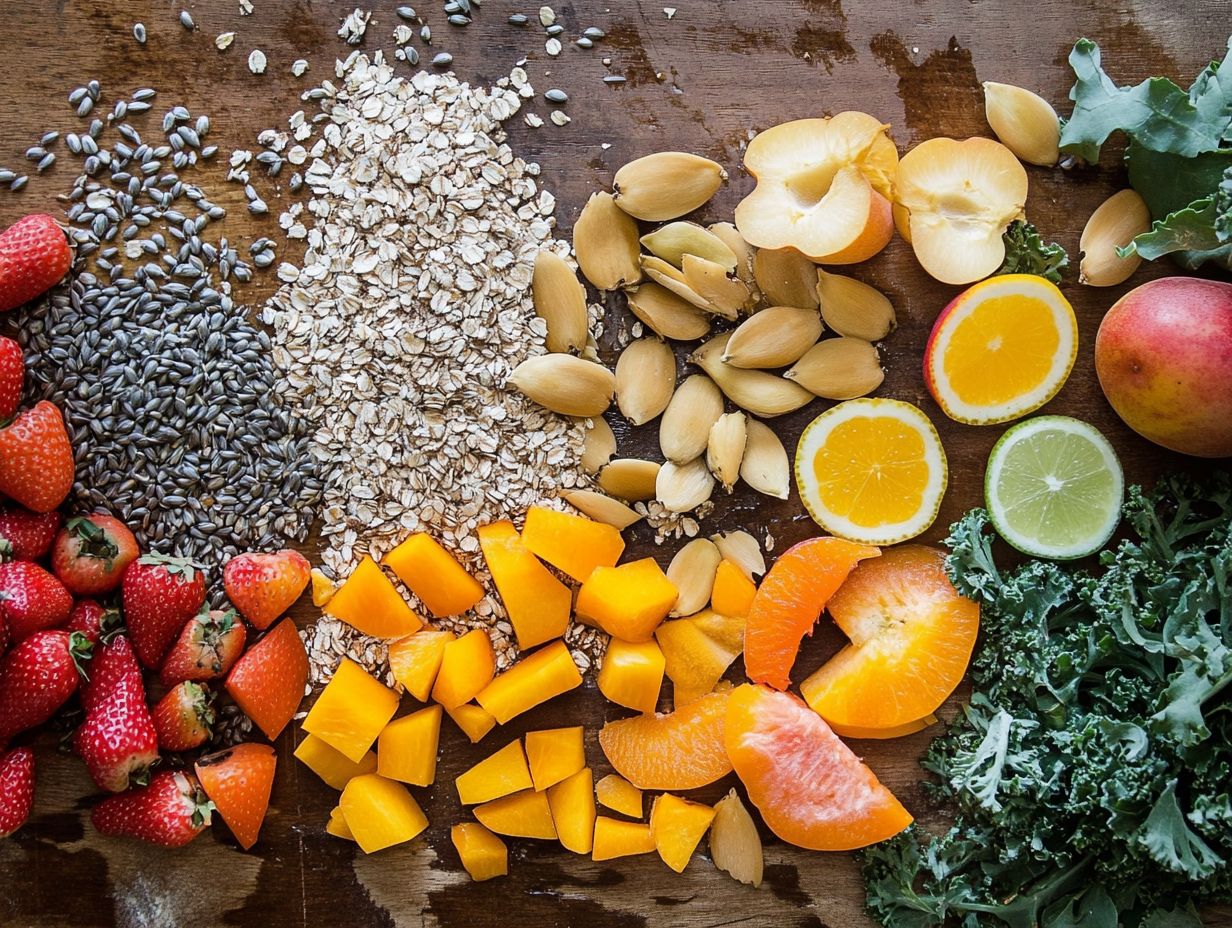
Establishing a proper feeding schedule for your bird is vital for maintaining its health. It ensures your bird receives the necessary nutrition and hydration throughout the day.
Different species have unique feeding needs influenced by factors like age, size, and activity level. For instance, younger birds typically need more frequent meals to support their growth. Larger species may require fewer but more substantial portions to meet their dietary needs.
Activity levels also play a critical role. Active birds tend to burn more energy and may need more frequent feedings to replenish their energy reserves.
Ensuring your feathered friend stays well-hydrated is essential for overall health. Offer fresh water daily and monitor hydration through signs like feather condition and behavior to help maintain their well-being.
What Are Some Signs of Poor Nutrition in Birds?
Signs of poor nutrition in birds like lethargy, feather plucking, and unusual behavior are red flags that require your immediate attention. If you notice these symptoms, it’s crucial to address any dietary imbalances without delay.
These indicators often reveal that a bird’s nutritional needs aren’t being sufficiently met. This can lead to serious health issues if overlooked. Pay close attention to how your bird interacts with its surroundings. For example, a drop in vocalization or social engagement may hint at deeper nutritional concerns.
To tackle these issues effectively, reassess their diet. Strive for a balanced mix of high-quality pellets, seeds, fruits, and vegetables. Consulting with avian veterinarians can provide expert guidance in crafting personalized meal plans that cater to your feathered friend’s unique needs.
Can Supplements Be Beneficial for Birds?
Supplements can significantly enhance your bird’s diet. They provide essential vitamins and minerals that might be missing. This is especially important if you’re relying on seed diets or other imbalanced feeding methods.
You have a variety of supplements at your disposal, including those rich in calcium, omega-3 fatty acids, and vital probiotics. These additions can elevate your bird’s overall health, promoting feather growth, boosting immune function, and improving digestion.
Consider incorporating these supplements, particularly during molting or breeding seasons when their nutritional needs spike. Be cautious about over-supplementation as it can lead to toxicity or imbalances, which can worsen malnutrition and negatively impact your bird’s health.
Consulting with an avian vet will help ensure that any supplements you choose harmonize with a balanced diet without causing harm.
How Can You Ensure Your Bird Is Getting Enough Water?
Ensuring your bird gets enough water is essential for its hydration and overall health. Proper hydration influences everything from digestion to feather quality.
Monitor their water intake while encouraging consistent consumption. Providing fresh, clean water daily is non-negotiable. Using appropriately sized, shallow dishes makes access easier, especially for smaller birds.
By observing their drinking habits and frequently changing the water, you can prevent contamination. Keep a sharp eye out for signs of dehydration, such as lethargy, drooping wings, and dull feathers. If you notice any signs, promptly offer electrolyte solutions or consult a veterinarian to address these serious concerns and promote recovery.
Frequently Asked Questions
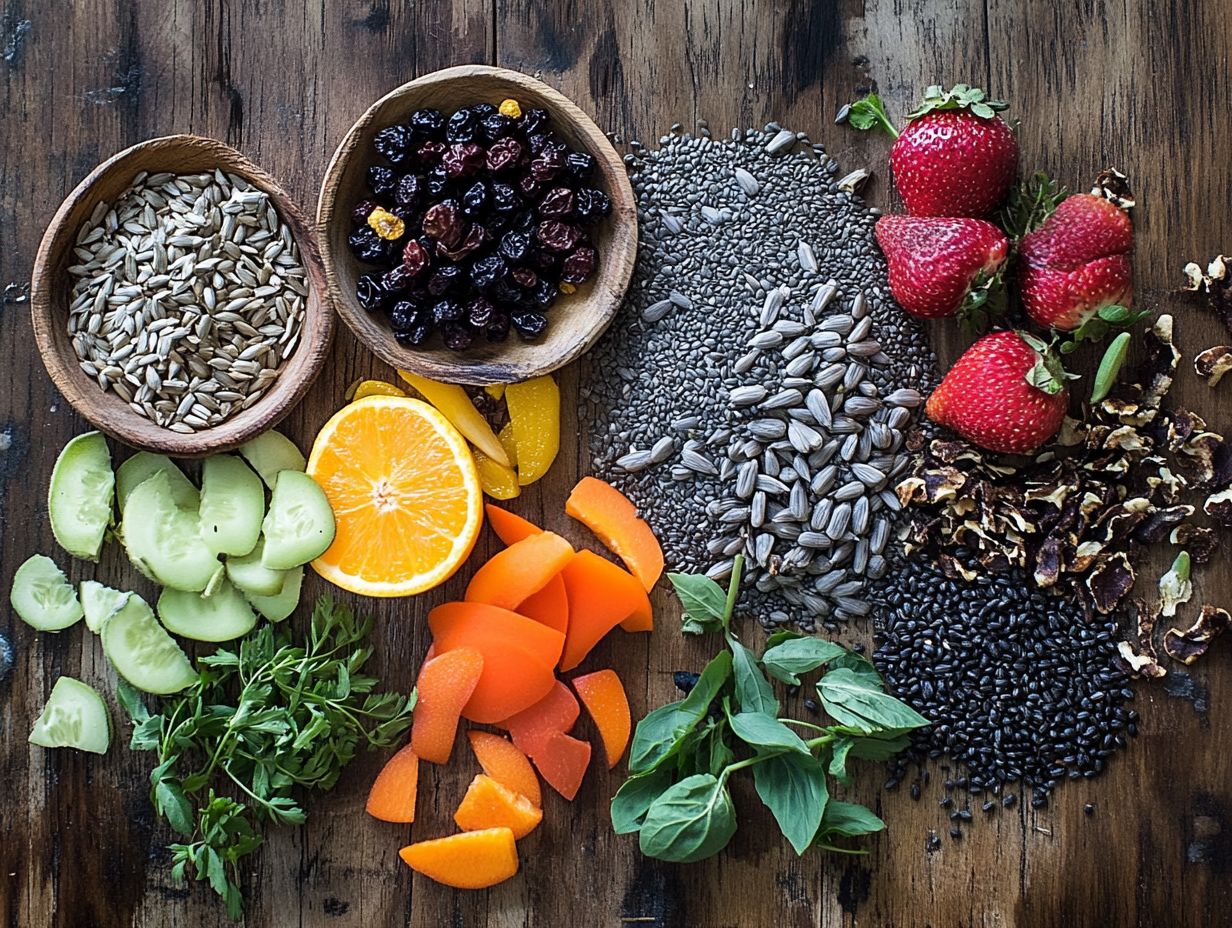
What are the 5 essentials in bird nutrition that I must know?
The 5 essentials in bird nutrition are water, protein, carbohydrates, fats, and vitamins and minerals. Understanding a balanced diet for pet birds is crucial for a bird’s health and well-being.
How important is water in a bird’s diet?
Water is essential for a bird’s survival, making up 60-70% of their overall body weight. They need access to clean, fresh water at all times to stay hydrated and maintain proper bodily functions.
Why is protein important for birds?
Protein is vital for building and repairing tissues. It also helps produce hormones and enzymes.
Birds need high-quality sources like insects, seeds, and nuts.
Do birds need carbohydrates in their diet?
Yes, carbohydrates provide essential energy for birds. Focus on complex carbs, such as whole grains, instead of simple sugars.
What role do fats play in a bird’s nutritional needs?
Fats offer a high-energy food source and help maintain healthy skin and feathers. However, too much fat can lead to obesity and other health issues.
Why are vitamins and minerals important for birds?
Vitamins and minerals are crucial for a bird’s health and well-being. They support vital bodily functions and help prevent deficiencies and diseases.
A balanced diet is key to ensuring they get all the nutrients they need.

